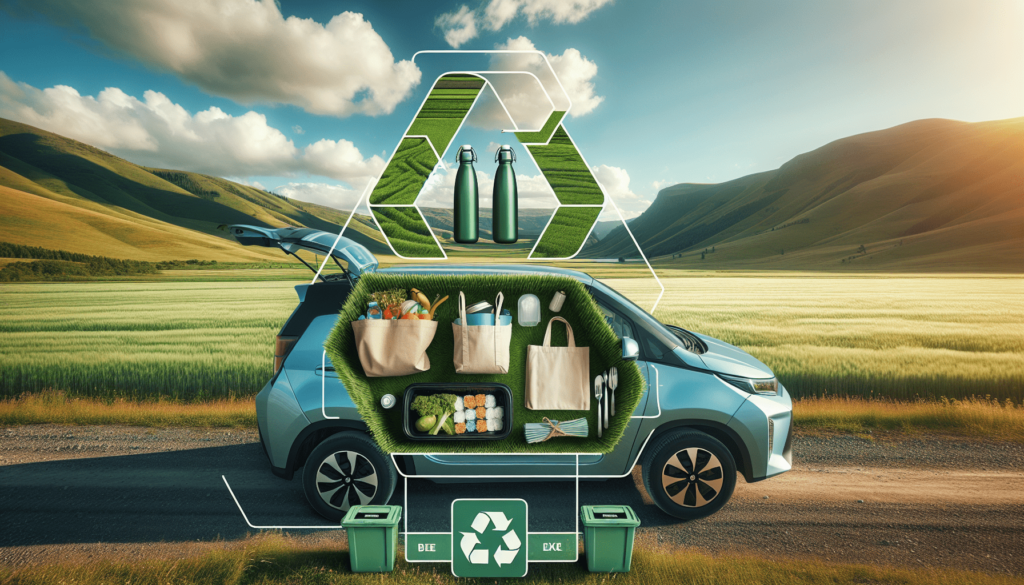Planning a road trip can be an exciting and thrilling experience, but have you ever thought about planning a sustainable road trip? In this article, discover the key steps and tips to ensure that your journey is not only enjoyable but also environmentally friendly. From choosing fuel-efficient vehicles to opting for locally sourced food and supporting eco-friendly accommodations, learn how to minimize your carbon footprint while embarking on your adventure of a lifetime. Get ready to hit the road, leave a positive impact, and create unforgettable memories along the way!

Choose a Fuel-Efficient Vehicle
When planning a sustainable road trip, it is crucial to start by choosing a fuel-efficient vehicle. By opting for a vehicle with high fuel efficiency, you can significantly reduce your carbon footprint and minimize your impact on the environment. Research various fuel-efficient vehicle options available in the market, such as hybrid or electric cars. These vehicles use less fuel and produce lower emissions compared to traditional gasoline-powered cars. Renting a hybrid or electric vehicle for your road trip can also be a great option if you don’t own one yourself. It not only provides you with a sustainable mode of transportation but also allows you to experience the benefits of these eco-friendly vehicles firsthand. Before finalizing your choice, calculate the fuel consumption and emissions of your chosen vehicle to fully understand its environmental impact.
Plan Your Route Wisely
Planning your route wisely is essential for a sustainable road trip. Opt for the most direct and efficient route between your destinations to minimize fuel consumption and emissions. By reducing the distance you travel, you can drastically decrease your carbon footprint. Additionally, take the time to research alternative transport options for certain legs of your journey. In some cases, public transportation might be a more sustainable choice, especially in cities where traffic congestion and limited parking options can be a challenge. Identifying and avoiding high-traffic areas can further help reduce emissions and save both time and fuel during your road trip.
Pack Light and Smart
An often-overlooked aspect of sustainable road trips is packing light and smart. Traveling with minimal luggage not only makes your journey more convenient but also reduces the weight in your vehicle, which in turn improves fuel efficiency. Avoid overpacking and pack only the essentials to minimize the load on your vehicle. Additionally, opt for reusable and eco-friendly items such as reusable water bottles, food containers, and shopping bags. By avoiding single-use items during your trip, you can significantly reduce waste and promote sustainability.
Optimize Fuel Efficiency
To ensure optimal fuel efficiency during your road trip, it is important to adopt some driving habits that conserve energy and minimize fuel consumption. One key practice is to drive at a moderate speed and avoid rapid acceleration. By maintaining a steady speed, you can maximize fuel efficiency and reduce emissions. Additionally, keeping your tires properly inflated is crucial as it reduces rolling resistance, thus improving fuel economy. Regularly check your tire pressure throughout your journey. It is also essential to avoid unnecessary idling and aggressive driving, as these behaviors not only waste fuel but also increase the emission of harmful pollutants.

Choose Eco-Friendly Accommodations
When considering accommodations for your road trip, prioritize eco-friendly options. Look for certified green hotels or eco-lodges that are committed to sustainable practices. These establishments typically focus on conserving energy, reducing water consumption, and minimizing waste generation. Another alternative is camping, which provides a unique opportunity to connect with nature while having a minimal environmental impact. If camping is not your preference, choose accommodations that are located close to your planned attractions or activities. By reducing travel distance, you can minimize fuel consumption and emissions.
Support Local and Sustainable Businesses
Supporting local and sustainable businesses is another important aspect of planning a sustainable road trip. Dine at local restaurants that prioritize sustainable and organic ingredients in their menus. By opting for locally sourced food, you not only support local farmers and reduce carbon emissions associated with long-distance transportation but also enjoy fresh and flavorful meals. Similarly, shop at local markets and support local artisans to promote the local economy and reduce your carbon footprint. Additionally, take the time to research and support eco-friendly tour operators or attractions that prioritize sustainability in their operations.
Practice Waste Reduction
Waste reduction is a key component of sustainable road trips. Carry reusable water bottles and containers to minimize the use of single-use plastics. This not only helps reduce waste but also saves you money in the long run. When shopping for supplies or groceries during your trip, try to minimize packaging waste by buying in bulk or choosing products with minimal packaging. Properly dispose of waste and recycle whenever possible, adhering to the recycling guidelines of the places you visit. By practicing waste reduction, you can contribute to a cleaner and more sustainable environment.
Offset Your Carbon Footprint
Even with all the sustainable practices in place, it is challenging to completely eliminate the carbon emissions associated with travel. To address this, consider calculating your trip’s carbon emissions and take steps to offset them. Many organizations and initiatives offer verified carbon offset projects where you can invest to compensate for your carbon footprint. These projects typically focus on activities that reduce greenhouse gas emissions or promote renewable energy. By supporting such initiatives, you can contribute to the global effort of carbon neutrality and make your road trip more environmentally sustainable.
Explore Alternative Transportation
Exploring alternative transportation options is a great way to enhance the sustainability of your road trip. In cities, consider using public transportation whenever possible. Utilize buses, trains, or trams to navigate through urban areas, reducing your reliance on private vehicles and mitigating traffic congestion and pollution. Another option is to rent bicycles or use bike-sharing programs where available. Cycling not only provides a fun and efficient mode of transportation but also promotes physical activity and reduces carbon emissions. Additionally, consider utilizing electric transportation options, such as scooters or electric bikes, to further minimize your carbon footprint.
Respect and Appreciate Nature
A sustainable road trip is not just about minimizing your impact; it also involves respecting and appreciating the natural environment around you. To ensure minimal environmental impact, always leave nature as you found it and avoid littering. Dispose of any waste responsibly, using designated trash bins or recycling facilities. When exploring natural areas, stay on designated trails to prevent soil erosion and disturbance to wildlife habitats. Take the time to learn about and respect the local wildlife and ecosystems you encounter during your trip. By following these simple guidelines, you can foster a deep connection with nature and contribute to its preservation for future generations.
Planning a sustainable road trip requires thoughtful consideration and conscientious decision-making. By choosing fuel-efficient vehicles, planning your route wisely, packing light, optimizing fuel efficiency, selecting eco-friendly accommodations, supporting local businesses, practicing waste reduction, offsetting your carbon footprint, exploring alternative transportation, and respecting nature, you can embark on a truly sustainable and eco-friendly adventure. Remember, every small action makes a difference, and by making sustainable choices, you can enjoy your road trip while preserving the planet for generations to come. Happy and sustainable travels!

